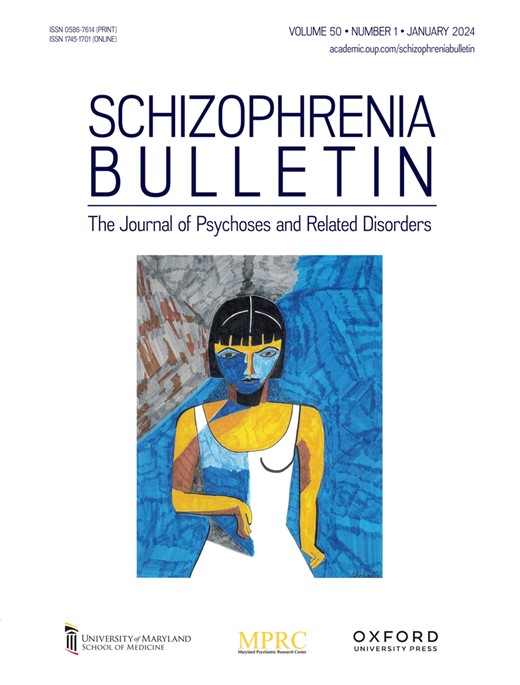国家精神卫生研究所对精神分裂症认知治疗发展的支持:叙述性综述
IF 5.3
1区 医学
Q1 PSYCHIATRY
引用次数: 0
摘要
几十年来,美国国立精神卫生研究所(NIMH)一直支持对精神分裂症认知障碍的基础研究和转化研究。本文介绍了该研究所对认知评估和干预研究的持续承诺,这体现在三个标志性倡议--改善精神分裂症认知的测量和治疗研究、改善精神分裂症认知的认知神经科学治疗研究和研究领域标准--以及相关的资助公告中,这些研究涵盖了基础实验研究、疗效和比较效益试验,以及旨在促进实际治疗环境中认知保健的实施研究。我们讨论了自21世纪初以来科学和公共卫生政策的发展趋势如何影响了NIMH的治疗开发活动,从而使其更加关注:(1)反映最终用户对拟议研究效用的看法的包容性团队;(2)对离散神经认知过程的测量,为有针对性的干预措施提供信息;(3)临床试验,为假定的疾病机制、有希望的治疗目标和下游临床效果提供有用的信息;以及(4)在寻求对精神病进行可行而有效的认知干预时的 "生产紧迫性"。采用这些原则的计划促进了认知测量、药物开发和行为干预方法,旨在改善精神分裂症患者的神经认知和社区功能。NIMH 将继续支持由研究者发起的具有创新性和影响力的研究,以促进以患者为中心、临床有效和不断改进的精神病患者认知保健。本文章由计算机程序翻译,如有差异,请以英文原文为准。
National Institute of Mental Health Support for Cognitive Treatment Development in Schizophrenia: A Narrative Review
For several decades the National Institute of Mental Health (NIMH) has supported basic and translational research into cognitive impairment in schizophrenia. This article describes the Institute’s ongoing commitment to cognitive assessment and intervention research, as reflected by three signature initiatives—Measurement and Treatment Research to Improve Cognition in Schizophrenia; Cognitive Neuroscience Treatment Research to Improve Cognition in Schizophrenia; and Research Domain Criteria—and related funding announcements that span basic experimental studies, efficacy and comparative effectiveness trials, and implementation research designed to promote cognitive healthcare in real-world treatment settings. We discuss how trends in science and public health policy since the early 2000s have influenced NIMH treatment development activities, resulting in greater attention to (1) inclusive teams that reflect end-user perspectives on the utility of proposed studies; (2) measurement of discrete neurocognitive processes to inform targeted interventions; (3) clinical trials that produce useful information about putative illness mechanisms, promising treatment targets, and downstream clinical effects; and (4) “productive urgency” in pursuing feasible and effective cognitive interventions for psychosis. Programs employing these principles have catalyzed cognitive measurement, drug development, and behavioral intervention approaches that aim to improve neurocognition and community functioning among persons with schizophrenia. NIMH will maintain support for innovative and impactful investigator-initiated research that advances patient-centered, clinically effective, and continuously improving cognitive health care for persons with psychotic disorders.
求助全文
通过发布文献求助,成功后即可免费获取论文全文。
去求助
来源期刊

Schizophrenia Bulletin
医学-精神病学
CiteScore
11.40
自引率
6.10%
发文量
163
审稿时长
4-8 weeks
期刊介绍:
Schizophrenia Bulletin seeks to review recent developments and empirically based hypotheses regarding the etiology and treatment of schizophrenia. We view the field as broad and deep, and will publish new knowledge ranging from the molecular basis to social and cultural factors. We will give new emphasis to translational reports which simultaneously highlight basic neurobiological mechanisms and clinical manifestations. Some of the Bulletin content is invited as special features or manuscripts organized as a theme by special guest editors. Most pages of the Bulletin are devoted to unsolicited manuscripts of high quality that report original data or where we can provide a special venue for a major study or workshop report. Supplement issues are sometimes provided for manuscripts reporting from a recent conference.
 求助内容:
求助内容: 应助结果提醒方式:
应助结果提醒方式:


